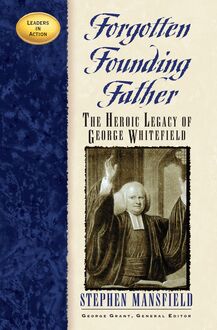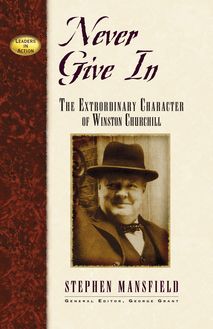Forgotten Founding Father , livre ebook
123
pages
English
Ebooks
2001
Vous pourrez modifier la taille du texte de cet ouvrage
Obtenez un accès à la bibliothèque pour le consulter en ligne En savoir plus
Découvre YouScribe en t'inscrivant gratuitement
Découvre YouScribe en t'inscrivant gratuitement
123
pages
English
Ebooks
2001
Vous pourrez modifier la taille du texte de cet ouvrage
Obtenez un accès à la bibliothèque pour le consulter en ligne En savoir plus
Publié par
Date de parution
01 mai 2001
Nombre de lectures
0
EAN13
9781620452516
Langue
English
Whitefield: A Giant Among Leaders
As a student at Oxford University, George Whitefield experienced a spiritual awakening under the influence of John Wesley’s Methodists and immediately began tending to prisoners, caring for the poor, and preaching the gospel. He met with astounding success, going on to speak to larger and larger crowds that included some of the largest gatherings in the history of England. He became the most famous preacher of his age.
His impact upon the American colonies, however, may have been his most lasting achievement. His preaching from Georgia to Maine was instrumental in the Great Awakening of the 1700s, and when he learned that England tended to tighten her control over the colonies, Whitefield warned his American friends in sermon after sermon, even accompanying Benjamin Franklin on his travels to make the American case in the Court of St. James.
Forgotten Founding Father is an incisive look at the qualities of leadership that made him such an effective and powerful figure in both England and America and left a legacy that continues to this day.
Publié par
Date de parution
01 mai 2001
Nombre de lectures
0
EAN13
9781620452516
Langue
English
O THER B OOKS IN THE L EADERS IN A CTION S ERIES
Beyond Stateliest Marble: The Passionate Femininity of Anne Bradstreet by Douglas Wilson
Call of Duty: The Sterling Nobility of Robert E. Lee by J. Steven Wilkins
Carry a Big Stick: The Uncommon Heroism of Theodore Roosevelt by George Grant
For Kirk and Covenant: The Stalwart Courage of John Knox by Douglas Wilson
Give Me Liberty: The Uncompromising Statesmanship of Patrick Henry by David J. Vaughan
Never Give In: The Extraordinary Character of Winston Churchill by Stephen Mansfield
Not a Tame Lion: The Spiritual Legacy of C. S. Lewis by Terry W. Glaspey
Then Darkness Fled: The Liberating Wisdom of Booker T. Washington by Stephen Mansfield
Forgotten Founding Father
T HE H EROIC L EGACY OF G EORGE W HITEFIELD
STEPHEN MANSFIELD
L EADERS IN A CTION
G ENERAL E DITOR , G EORGE G RANT
HIGHLAND BOOKS
CUMBERLAND HOUSE • NASHVILLE, TENNESSEE
Copyright © 2001 by Stephen Mansfield
General Editor: George Grant
All rights reserved. Written permission must be secured from the publisher to use or reproduce any part of this book, except for brief quotations in critical reviews or articles.
Published by Cumberland House Publishing, Inc., 431 Harding Industrial Drive, Nashville, Tennessee 37211.
Library of Congress Cataloging-in-Publication Data
Mansfield, Stephen, 1958–
Forgotten founding father : the heroic legacy of George Whitefield / Douglas Wilson.
p. cm. — (Leaders in action)
Includes bibliographical references.
ISBN 1-58182-165-4 (alk. paper)
1. Whitefield, George, 1714–1770. 2. Evangelists—England—Biography. 3. Evangelists—United States—Biography. I. Title. II. Leaders in action series.
BX9225.W4 M36 2001
269'.2'092—dc21
[B] 2001028211
Printed in the United States of America
1 2 3 4 5 6 7 8 9—05 04 03 02 01
To the young lions who will soon lead us into the Greatest Awakening
C ONTENTS Foreword Acknowledgments Introduction Chronology Part 1: The Heroic Life of George Whitefield Prologue A Season of Darkness A Worm Taken from a Public House The Life of God in the Soul of Man The Boy Parson Setting England Aflame To Touch the Land of Destiny The Mad Trick To Make a People One Days of Strife and Torment Kingdom on the March To Free the Land of Promise The Fading of the Light Part 2: The Heroic Character of George Whitefield Preaching Anointing Action Spiritual Disciplines Unity Criticism Suffering Intercession Predestination Courage The Devil The Word The Sea Teachable Money Books Humility Divine Drama Feeling Truth The Poor Marriage Jesus Excesses Hardship Greatheart Slavery Knowledge America Humor Death Part 3: The Heroic Legacy of George Whitefield Forgotten Founding Father The Lessons of Leadership Notes Selected Bibliography
F OREWORD
H E WAS America’s first celebrity. Though just twenty-five years old when he began touring the sparsely settled colonies in 1738, George Whitefield was an immediate sensation. And he remained so for the rest of his life. Over the next thirty years, amidst some seven visits from his native England, he would leave his mark on the lives of virtually every English-speaking soul living on this side of the Atlantic—from the cosmopolitan businessmen of Philadelphia and the seasoned traders of Boston to the yeoman farmers of Virginia and the frontier adventurers of Canada.
He literally took America by storm. “When he arrived in the colonies,” says historian Mark Noll, “he was simply an event.” 1 Wherever he went, vast crowds gathered to hear him. Commerce would cease. Shops would close. Farmers would leave their plows mid-furrow. And affairs of the greatest import would be postponed. One of his sermons in the Boston Common actually drew more listeners than the city’s entire population. Another in Philadelphia spilled over onto more than a dozen city blocks. Still another in Savannah recorded the largest single crowd ever to gather anywhere in the colonies—despite the scant local population.
Some said he blazed across the public firmament like a “heavenly comet.” 2 Some said he was “a magnificent fascination of the like heretofore unknown.” 3 Others said he “startled the world awake like a bolt from the blue.” 4 There can be little doubt that he lived up to his reputation as “the marvel of the age.” 5 As historian Harry Stout has written: “He was a preacher capable of commanding mass audiences—and offerings—across two continents, without any institutional support, through the sheer power of his personality. Whitefield wrote best-selling journals and drew audiences totaling in the millions. White and black, male and female, friends and enemies—all flocked in unprecedented numbers to hear the Grand Itinerant. Whenever he visited, people could do anything, it seemed, but stay away.” 6
All the greatest men of the day were in unabashed awe of his oratorical prowess. Shakespearean actor David Garrick said, “I would give a hundred guineas if I could say oh like Mr. Whitefield.” 7 Benjamin Franklin once quipped, “He can bring men to tears merely by pronouncing the word Mesopotamia .” 8 And Sarah Edwards— the astute and unaffected wife of the dean of American theologians, Jonathan Edwards—remarked, “He is a born orator.” 9
Yet despite his wide acclaim and popularity, Whitefield was often ridiculed, scorned, and persecuted for his faith. Hecklers blew trumpets and shouted obscenities at him as he preached. Enraged mobs often attacked his meetings, robbing, beating, and humiliating his followers. Men were maimed. Women were stripped and occasionally raped. Whitefield himself was subjected to unimaginable brutality—he was clubbed twice, stoned once, whipped at least half a dozen times, and beaten a half dozen more. And he lived constantly under the pall of death threats. Once, he recorded in his journal: “I was honored with having a few stones, dirt, rotten eggs, and pieces of dead cats thrown at me. Nevertheless, the Lord was gracious, and a great number were awakened unto life.” 10
Amazingly, it was not just the profane who condemned Whitefield’s work. He was also opposed by the religious establishment. Accused of being “a fanatic,” of being “intolerant,” and of “flaming the flames” of “vile bigotry,” he was often in “more danger of attack from the clergy than he was from the worldly.” 11
As a result, biographer Arnold Dallimore says, “Whitefield’s entire evangelistic life was an evidence of his physical courage.” 12 He fearlessly faced his opposition and continued his work. Though often stung by the vehemence of the opposition he faced, he refused to take it personally, attributing it rather to “the offense of the Gospel.” 13
He was, in short, the embodiment of the American pioneer: vibrant, passionate, stalwart, accomplished, principled, courageous, and wise. Indeed, his daily disposition became the model for the American character. By all accounts, he was “the father of modern evangelism.” 14 He sparked a revival of portentous proportions—the Great Awakening. 15 He pioneered one of the most enduring church reform movements—Methodism. 16 And he laid the foundations for perhaps the greatest experiment in liberty the world has yet known—the American Republic. 17
George Washington said, “Upon his lips the Gospel appears even to the coarsest of men as sweet and as true as, in fact, it is.” 18 Patrick Henry mused, “Would that every bearer of God’s glad tidings be as fit a vessel of grace as Mr. Whitefield.” 19 And the poet, John Greenleaf Whittier, wrote of him:
That life of pure intent,
That voice of warning, yet eloquent,
Of one on the errands of angels sent. 20
He became, as Stephen Mansfield asserts in this sketch of his leadership qualities, the father of America’s founding fathers. That he is largely forgotten today is therefore all the more tragic. That Dr. Mansfield has recovered his legacy is therefore all the more significant.
By offering us a fresh and vivid perspective of Whitefield’s accomplishments, personal life, character, and struggles, Dr. Mansfield has produced a book that is not merely a compelling biography of a bygone hero, he has exposed for us the foundations of our heritage. As in his previous works on Winston Churchill and Booker T. Washington, he has demonstrated not only that he is a masterful storyteller, a careful historian, and an insightful analyst, he also shows us that he understands how the unfolding of past providence is not merely a review of antedated events but a preview of what should be, what could be, if only we would heed the lessons of our own legacy.
It is thus an apt and welcome addition to his already rich contributions to the Leaders in Action series. Indeed, it is an apt and welcome addition to the essential annals of Christian moral philosophy.
—George Grant
A CKNOWLEDGMENTS
T HE GRATITUDE of a lifetime I offer to Wayne Palmer for teaching me spiritual passion, to Kevin Ikenberry for teaching me the beauty of knowledge, to Oral Roberts for teaching me conviction, to David Toberty for teaching me how to laugh, to Bob Stamps for teaching me tradition, to Greg Webb for teaching me to live large, to Peter Marshall for teaching me providence, to Wilma Carter for teaching me Jesus, to Ryan Rowlands for trying—desperately—to teach me racquetball, to Rousas Rushdoony for teaching me history, to Walter Judd for teaching me greatness, to Don Finto for teaching me simplicity, to George Grant for simply teaching me, and to those who are my critics for being the unpaid guardians of my soul.
I NTRODUCTION
I T HAD never been done. Perhaps it never would be. Perhaps it was impossible. After all, for generations men had dreamed of it, trained for it, and made it their measure of manhood. But no one had done it. No one had ever run the mile in less than four minutes.
Then it happened. On May 6, 1954, an Oxford medical student by the name of Roger Bannister made history by breaking the four-minute mile. The news was electrifying. A man had finally broken the le

